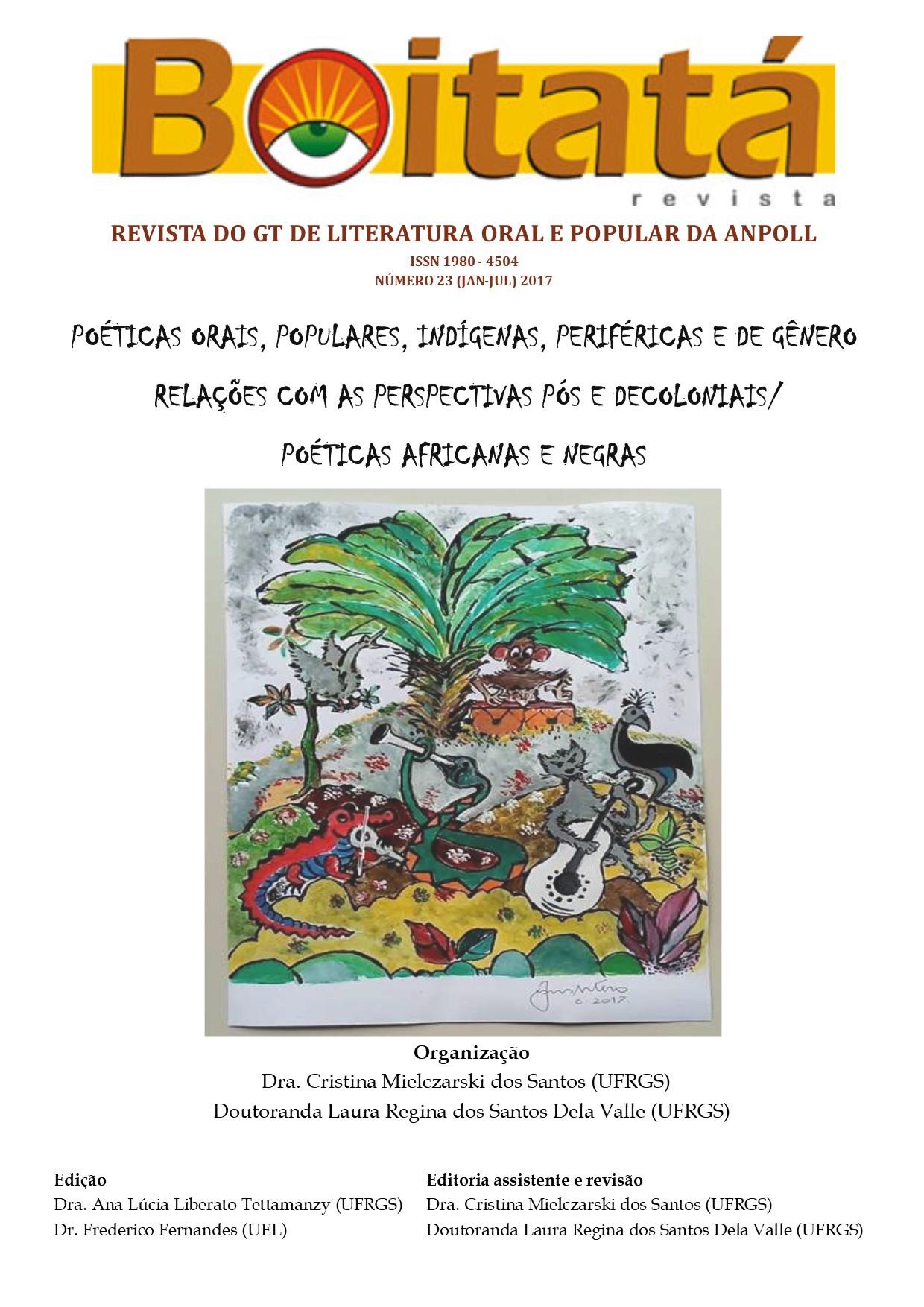"Boca também toca tambor": poesia e performance de Ricardo Aleixo
DOI:
https://doi.org/10.5433/boitata.2017v12.e30684Palavras-chave:
Ricardo Aleixo, Poesia contemporânea, Tradição oral, Griô/akpalô.Resumo
O artigo visa realizar uma leitura de três peças do poeta mineiro Ricardo Aleixo: o poema "Boca também toca tambor", do livro Mundo palavreado, de 2013; o poema "Solo", de Modelos vivos, de 2010 (republicado em Mundo palavreado); e um trecho da performance "Modelos vivos movidos a moedas" na qual o poeta vocaliza o verso título do primeiro poema citado, que reaparece no poema "Solo". A partir desses materiais, a leitura irá abordar o modo como eles trazem à tona a herança da tradição oral (especialmente afro-brasileira) e suas relações com referências dadaístas, também presentes. Averigua-se o redimensionamento da tradição em relação às novas tecnologias, uma operação de resgate e ao mesmo tempo de inauguração. Pretende-se evidenciar a presença do griô/akpalô em suas diferentes manifestações, bem como a referência à poesia dadá e à "palavra-trovão" de James Joyce, provenientes de outra tradição, e o modo como esses elementos se relacionam em um espaço criativo marcado pelo uso de procedimentos contemporâneos.Downloads
Não há dados estatísticos.
Referências
ALEIXO, Ricardo. Modelos vivos. Belo Horizonte: Crisálida, 2010.
ALEIXO, Ricardo. Mundo palavreado. São Paulo: Peirópolis, 2013.
ALEIXO, Ricardo."Boca também toca tambor".1'33''.
ANDRADE, Oswald de. Obras completas VI: do Pau-Brasil à antropofagia e às utopias. Manifestos, teses de concursos e ensaios. Rio de Janeiro: Civilização Brasileira, 1970.
BENISTE, José. Mitos yorubás: o outro lado do conhecimento. Rio de Janeiro: Bertrand Brasil, 2006.
CASCUDO, Luis da Câmara. Literatura oral no Brasil. Belo Horizonte: Ed. Itatiaia. São Paulo: Ed. Da USP, 1984.
CORTÁZAR, Julio. Valise de cronópio. Tradução de Davi Arriguci Jr. e João Alexandre Barbosa. São Paulo: Perspectiva, 1993.
FREYRE, Gilberto. Casa grande e senzala: formação da família brasileira sob o regime da economia patriarcal. 49. ed. São Paulo: Global, 2004.
GOLDSTEIN, Norma. Versos, sons, ritmos. São Paulo: Ática, 2001.
GUMBRECHT, Hans Ulrich. Produção de presença: o que o sentido não consegue transmitir. Rio de Janeiro: Contraponto: Ed. PUC - Rio, 2010.
JOYCE, James. Finnegans wake. London: Faber and Faber, 1975.
ONG, Walter J. Oralidade e cultura escrita: tecnologias da palavra. Tradução de Enid Abreu Dobránsky. Campinas: Papirus, 1998.
PAZ, Octavio. O arco e a lira. Tradução de Olga Savary. Rio de Janeiro: Nova Fronteira, 1982.
PEREIRA DA VIOLA, Akpalô. Produzido por Terra Boa Produções e Cria! Cultura, gravado e mixado em 2006 em Belo Horizonte.
PRANDI, Reginaldo; VALLADO, Armando. "Xangô, rei de Oió". Disponível em: . Acesso em: 10 mar. 2015.
RICHTER, Hans Georg. Dadá: arte e antiarte. Tradução de Marion Fleischer. São Paulo: Martins Fontes, 1993.
ROSÁRIO, Lourenço Joaquim da Costa. A narrativa africana de expressão oral: transcrita em português. Lisboa: Instituto de Cultura e Língua Portuguesa; Luanda: Angolê, 1989.
SCHWITTERS, Kurt. Contos Mércio. Tradução de Maria Aparecida Barbosa. Florianópolis: Editora da UFSC, 2013.
VALENTE, Heloísa Duarte. As vozes da canção na mídia. São Paulo: Via Lettera/Fapesp, 2003.
ALEIXO, Ricardo. Mundo palavreado. São Paulo: Peirópolis, 2013.
ALEIXO, Ricardo."Boca também toca tambor".1'33''.
ANDRADE, Oswald de. Obras completas VI: do Pau-Brasil à antropofagia e às utopias. Manifestos, teses de concursos e ensaios. Rio de Janeiro: Civilização Brasileira, 1970.
BENISTE, José. Mitos yorubás: o outro lado do conhecimento. Rio de Janeiro: Bertrand Brasil, 2006.
CASCUDO, Luis da Câmara. Literatura oral no Brasil. Belo Horizonte: Ed. Itatiaia. São Paulo: Ed. Da USP, 1984.
CORTÁZAR, Julio. Valise de cronópio. Tradução de Davi Arriguci Jr. e João Alexandre Barbosa. São Paulo: Perspectiva, 1993.
FREYRE, Gilberto. Casa grande e senzala: formação da família brasileira sob o regime da economia patriarcal. 49. ed. São Paulo: Global, 2004.
GOLDSTEIN, Norma. Versos, sons, ritmos. São Paulo: Ática, 2001.
GUMBRECHT, Hans Ulrich. Produção de presença: o que o sentido não consegue transmitir. Rio de Janeiro: Contraponto: Ed. PUC - Rio, 2010.
JOYCE, James. Finnegans wake. London: Faber and Faber, 1975.
ONG, Walter J. Oralidade e cultura escrita: tecnologias da palavra. Tradução de Enid Abreu Dobránsky. Campinas: Papirus, 1998.
PAZ, Octavio. O arco e a lira. Tradução de Olga Savary. Rio de Janeiro: Nova Fronteira, 1982.
PEREIRA DA VIOLA, Akpalô. Produzido por Terra Boa Produções e Cria! Cultura, gravado e mixado em 2006 em Belo Horizonte.
PRANDI, Reginaldo; VALLADO, Armando. "Xangô, rei de Oió". Disponível em: . Acesso em: 10 mar. 2015.
RICHTER, Hans Georg. Dadá: arte e antiarte. Tradução de Marion Fleischer. São Paulo: Martins Fontes, 1993.
ROSÁRIO, Lourenço Joaquim da Costa. A narrativa africana de expressão oral: transcrita em português. Lisboa: Instituto de Cultura e Língua Portuguesa; Luanda: Angolê, 1989.
SCHWITTERS, Kurt. Contos Mércio. Tradução de Maria Aparecida Barbosa. Florianópolis: Editora da UFSC, 2013.
VALENTE, Heloísa Duarte. As vozes da canção na mídia. São Paulo: Via Lettera/Fapesp, 2003.
Downloads
Publicado
2017-09-14
Como Citar
SCHERER, Telma. "Boca também toca tambor": poesia e performance de Ricardo Aleixo. Boitatá, Londrina, v. 12, n. 23, p. 144–163, 2017. DOI: 10.5433/boitata.2017v12.e30684. Disponível em: https://ojs.uel.br/revistas/uel/index.php/boitata/article/view/30684. Acesso em: 25 fev. 2026.
Edição
Seção
Dossiê
Licença
Copyright (c) 2017 Telma Scherer

Este trabalho está licenciado sob uma licença Creative Commons Attribution 4.0 International License.
Boitatá esta licenciada com CC BY sob essa licença é possível: Compartilhar - copiar e redistribuir o material em qualquer suporte ou formato. Adaptar - remixar, transformar, e criar a partir do material, atribuindo o devido crédito e prover um link para a licença e indicar se mudanças foram feitas.






















